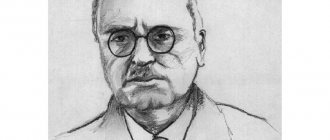An open person is one who is not afraid or embarrassed to express his opinion, share his thoughts and feelings with other people, talk about his experiences (successful and unsuccessful, victories and defeats) and about himself (advantages and disadvantages, strengths and weaknesses) , hobbies, etc.). And also this is someone who is ready to listen to any person and tries to understand and accept everyone he meets. Let's take a closer look at who an open person is and how openness manifests itself. We will also learn how to become an open person.
Definition
Take a closer look at your surroundings? Do people often say what they think? Rarely? This means your friends are not being completely honest. An open person is a person who lives the way she wants. The person says what he thinks and does what he wants, taking into account the limits of decency, of course. An open person is a person who is not afraid of condemnation and misunderstanding. Such individuals do not worry about what their relatives and neighbors will say about them. You cannot expect betrayal from an open person, since he will not take such a step. He will express to your face all the complaints that he has right away, and will not wait for the right moment to dumbfound you. Open people are always welcoming and friendly. They are ready for change and new acquaintances. Their peace of mind can be disturbed, but they will quickly return to normal, since the habit of accumulating negative thoughts is alien to them.
Some people believe that an open person is a person who puts the burden of his problems on your shoulders every day. Probably everyone has met someone who, over a cup of tea, told how sad his life was, thereby managing to ruin the mood of his interlocutor. Such people are energy vampires; they have nothing to do with openness.
Properties of frankness
As for the properties of frankness, they also differ in positive and negative sides. A frank person is ready to open his own inner world of emotions and thoughts to others.
Revealing is the desire to tell or talk about personal, intimate, often secret aspects of life. This concept is valued as honesty, an indicator of trust. Frankness refers to intimacy, close relationships between people.
But untimely, excessive or objectionable frankness becomes a violation of the rules of etiquette. Unlike sincerity (expressing true feelings and intentions), showing candor is sometimes not relevant to the interlocutor. This does not always cause pleasant emotions.
If a sincere person is usually focused on the future, then a frank person more often tells others about his choices, actions, and current spiritual state. But a frank person sometimes remains sincere. This creates additional tension, because... a person is directly told not only the truth about his attitude towards him, but the absolute truth.
Typically, frankness is confessional in nature. A person takes off the burden, reports his own weaknesses, negative qualities, complexes, and bad deeds. If the manifestation of this quality goes along with intelligence, then it is regarded as trust and honesty. This is an indicator of feelings. Such behavior soon weeds out unnecessary individuals in any area of life. In addition, frankness is sometimes combined with the need to get advice in a specific personal situation.
Frankness becomes a way beyond everyday relationships, when this manifestation is mutual - good, but unilaterally it brings negativity. Frankness becomes an object of manipulation, but at the same time it itself acts as a tool for manipulating others.
Psychologists note that frankness entertains vanity. It is enough to trust someone with a secret, how this person feels more important and significant than before. It is worth noting that neither time nor spiritual expenditure is required in order to give others a chance to feel more confident.
Sometimes frankness becomes the cause of tension in moral and psychological terms, because when a person is told the truth about him straightforwardly, but he is not ready to accept it, it degenerates into complexes, etc. But too much frankness becomes rashness.
Signs
A good person can be seen from afar. His eyes, smile and body movements give him away. What are the signs of an open person? This person uses broad gestures. What it is? You are walking down the street and see two passers-by. One of them is shy and therefore hides his hands in his pockets. The other does not pay attention to those around him, gesticulates widely and can talk quite loudly. From the outside, you might think that this person simply does not notice those around him. Such a person is open, she is not afraid of condemnation, she is emotional and does not want to hide it.
An open person, even if he walks alone, will still stand out from the crowd. The person will not look at the asphalt. The person will observe those around him and walk with his head raised. The movements will express self-confidence and relaxedness. Moreover, this freedom often manifests itself in an extravagant appearance.
Character traits
An open person is a sincere person. What's in a person's head is on his tongue. He won't keep what he thinks to himself. If an open person likes something about you, he will certainly express it. It doesn't matter what exactly it will be. Perhaps the person will like your appearance, your joke or some statement. But keep in mind that if your open interlocutor is dissatisfied with something, he will not hide it. You will learn about what, in his opinion, are considered shortcomings and what you need to change in yourself.
Sharp mood swings are often found in open personalities. Why? A person quickly reacts to a changing situation, and these changes will not always be pleasant. Irritation may give way to genuine joy, which in turn will give way to bewilderment and then elation.
Despite sudden changes in mood, an open person will remain friendly. He will react to all visible changes and at the same time almost always be in a good mood. Even criticism from the mouth of such a person will not sound angry. An open person does not want to offend anyone and talks about the shortcomings of others only so that people change for the better.
My experience
Judging by the fragments of my memories and the stories of other people, from birth I was an active and open child. I loved to be the center of attention, performed in all kinds of amateur performances, laughed loudly and sincerely, and was not afraid of people. And then complexes and traumas burst into my life, because of which I began to withdraw into myself. I could no longer be open and friendly with everyone, I was afraid to meet and communicate with other people.
Alone with the “chosen ones” (those who have been tested over the years and definitely accept anyone), I remained that same open, cheerful person. And in principle, it was possible to live like this, but until I moved to high school. And when I graduated from school, it became clear that it was impossible to live like this.
During self-analysis, I realized that I had not changed (as I initially thought), but had crushed myself. Somewhere in the depths of my soul there still lived that perky girl who knows how to joke, smiles when meeting even new acquaintances, has a relaxed conversation, is not afraid to express her opinion or tell something about herself, maybe wants to be the center of attention . And I realized that I missed it.
It turns out that I didn’t need to develop openness, but to regain myself. To do this, it was necessary to get rid of uncertainty, fears and complexes. It was also important to find your sources of strength (passions, hobbies) and decide on a profession. In general, in my opinion, self-acceptance and self-realization in life helps to become an open person.
I can’t say that now I have become as active and open as I once was in childhood. But I think there are two reasons for this. Firstly, the age is still different. For a long time now I have been focusing on the quality of contacts rather than quantity. And we shouldn’t forget about the spontaneity inherent in all children. Secondly, I do not rule out that excessive sociability and sociability in childhood were already a mechanism of psychological defense, because then I could be called more likely a follower than a leader. So here's another conclusion: openness and openness are different.
To analyze my progress, I focus on the following indicator: now I’m not afraid to interact with people, but sometimes it’s difficult (especially if the contact goes into the jungle of “you’re a psychologist”) and boring (I’ve already said that I stand for quality and don’t like conversations “ about nothing"). I also stopped being afraid of other people’s opinions and adapting to them, that is, I became truly open, and not convenient.
pros
There is something good in every personality. What advantages can be found in an open person? What personal qualities help such persons exist?
- Courage. To be an open person, you need to be very brave. Telling people what you think to their faces can sometimes be incredibly difficult. Yes, and it’s not always necessary. But an open person will always tell the truth, even if it is very bitter.
- Sincerity. An open person can always console and support. There is no anger, no envy, no resentment in him. Sincerity is rare these days. It’s always nice when there is a person nearby who can put you in your position and help you make the right choice.
- Independence. An open person will not hold anyone back and will not hold on to anyone. He is quite capable of living comfortably alone. Independence brings many benefits. A person can do whatever he wants, limiting his desires only to the limits of common sense.
- Simplicity. A person who is not deprived of sincerity will not wonder. It’s very pleasant to communicate with a person who doesn’t have questions.
Why do people have problems communicating?
Communication skills are developed in people throughout their lives, but there are 6 decisive factors that can affect an individual’s level of sociability. This:
- Upbringing
. Often, parents themselves become the cause of unsociability; they welcome in their child such traits as modesty, non-conflict, restraint, obedience, which can cause problems with communication in adulthood.
- Parental behavior
. If mom and dad are not inclined to communicate and have difficulty making friends, then the child will have no one to learn how to communicate and make friends with.
- Level of education and reading
. If a person does not have topics and arguments for a constructive conversation, then it will be quite difficult for him to become open and sociable. The solution here is clear - reading and the pursuit of knowledge.
- Experience of negative communication
. Children are for the most part inquisitive and sociable, but in response to a sincere desire to speak out, they may encounter a negative reaction from tired parents (“Be kind, be quiet, mom is very tired,” “It’s too early for you to know that!”) or strict teachers (“Be kind, be quiet, mom is very tired,” “It’s too early for you to know that!”) You will answer when the teacher asks you!”, “This is what you will take next year!”). Peer ridicule can also be an example of a negative communication experience.
- Character type
(introverts, not inclined to communicate, but focused on themselves, and extroverts, striving to interact with other people).
- Low self-esteem
. People who lack self-confidence find it difficult to build a personal life, make friends, or find a job they like.
All these factors are not as scary as they seem at first glance, and can be easily corrected with a competent approach and following simple rules.
Minuses
A person who is open to the world is not a gift for his friends. Despite all the advantages, such a personality also has its disadvantages.
- Inability to keep secrets. An open person will tell everyone and about everyone. No, he will not spread gossip, but in a fit of emotion he may blurt out something that he was asked to remain silent about.
- Frequent offensive statements. People don't always want to know the truth. Sometimes a person manages to deceive himself. Open individuals do not like this method of self-defense. They destroy illusions in which sometimes those around them find their salvation.
- Premature judgment. Open people can make a verdict about their new acquaintances immediately, without bothering themselves with long thoughts. Such premature judgments are often very different from the real situation.
Negative properties of openness
But openness is not always a positive quality. There are also negative properties of openness. Its untimely manifestation is regarded by others as an obsession; it is characterized by thoughtless simplicity. Openness is not always timely, and communicating unnecessary information can be costly.
Spiritually healthy individuals are open to others, but within reasonable limits. Openness and trust are important elements in building a warm relationship, but thoughtless trust is foolish.
There are many different people in the world, and a person’s environment is not always friendly. If you trust everyone and everyone, it will cause many problems and troubles. In addition to the ability to trust, it is also important to be able to understand others and have internal security. But such a concept should not be considered closed.
Closedness is rather a negative side, but security is a positive side. Successful individuals often follow a well-known principle, which states that you should believe in the best, but you need to prepare yourself for the worst. And those who are psychologically protected are able to truly trust. It is difficult to hurt such people.
If a person is confident and strong, then it is easier for her to trust and be open. The goal of developing inner strength and security is correct and important. It does not remove, but complements the understanding that trust is an important value in life.
How often do you meet such people?
Is there someone around you who can tell you everything he thinks? Hardly. Such people are rare in our time. Even though the trend in society favors openness, there is still no complete revelation. People prefer illusory reality. On social networks you can see a part of a person's life. But everyone understands that these are separate events that one or another individual agrees to show to the whole world. It is difficult to read thoughts and feelings from photographs, although sometimes it is possible. Why are there fewer open people every year? Because modern youth do not know how to live in harmony with themselves. Look at the people who travel on public transport. What are they doing? That's right, they are on social networks. Few people nowadays can look at the world with their own eyes, and not through the prism of a blue screen.
Frankness and openness
But what else is openness and frankness expressed in? What definitions exist for these concepts?
A person with an open soul is a person who is confident in his own abilities. Such people are ready to communicate, they are sociable. Such individuals tend to support others, they share thoughts and emotions.
How far we are willing to let another person into a certain world of our own is openness. The more areas of life we allow strangers into, the more open we are.
Public openness manifests itself externally in the form of sociability. Spiritual openness can warm you with a sincere attitude. And frankness will give a person the truth. In everyday parlance, openness refers primarily to internal openness.
Such people are able to share their own thoughts and emotions directly; they share personal hopes, aspirations, and dreams. Such a person easily communicates what she does not like and what is interesting. These people admit to hostility, affection, resentment, phobias and other feelings, they express their own opinions. At the same time, they do not hide what is in their souls, they are open to new things.
Internal openness will require trust. Those who believe are more likely to open up to others, which is why the concepts of “trust” and “openness” are often considered synonymous.
Is life easy for an open person?
Many people believe that frankness is something unrealistic for our time. But in reality everything is much simpler. Opening your soul to a person is only difficult in appearance. Open people live happier and more fulfilling lives than others. Such persons do not think about what their neighbors or friends will say about them. Open personalities know how to enjoy every day. Such individuals, despite their illusory originality, are completely trusted by those around them. A person who always tells only the truth is much more reliable than one who tells sweet lies.
How to become an open person
Want to make your life easier? Then think about transforming yourself not only, as is fashionable today, on the outside, but also on the inside. Open individuals are confident people. It is this quality that you need to develop in yourself first of all. Next, try to become more open with everyone you know. At first, you don’t have to express your opinion, but simply refuse to attend events that you don’t want to go to. Then you will need to get rid of gossip. If you are not satisfied with something about this or that person, tell her to her face. It is with this frankness that you need to begin to become open. Try to remove slander not only from your speech, but even from your thoughts. Don't think badly of people. Consider each person as a unique person, and if you see that a person is doing something bad, try to find the reason for his action. There is no need to justify such people, but understanding their motive is vital.
Negative traits
As with any excess, exaggerated openness can manifest itself negatively. If there is no rationality in the misdeeds of an open person, then he becomes intrusive, can put others in an uncomfortable position with his questions and comments, and is inappropriately frank and straightforward. Everything is good in moderation.
If you have similar problems, then I can recommend you the book by Nobel laureate Daniel Kahneman “Thinking Slowly... Solve Fast.” It just talks about how to turn on rational thinking and logic in time in order to avoid rash actions that you may later regret.











